12Mic-D
12-channel digitally controlled microphone preamplifier with Dante, ADAT & MADI
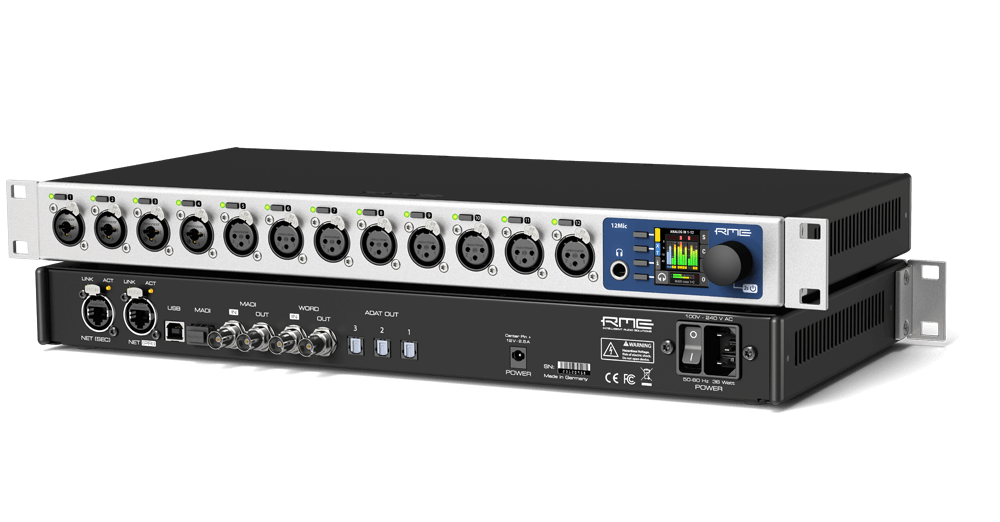

Connectivity and Features
Designed for the Next Decade - RME’s preamps for Audio Networks
The RME 12Mic-D features twelve microphone and line level inputs with digital, no-compromise, studio-quality conversion; remote controllable gains; integrated MADI and Dante connectivity; plus a multitude of additional functionality, designed to make it the perfect companion for any professional recording setup. The 12Mic-D is sonically identical to the already existing 12Mic (with 128 AVB channels) and complements the M-Series lineup of professional network audio solutions.
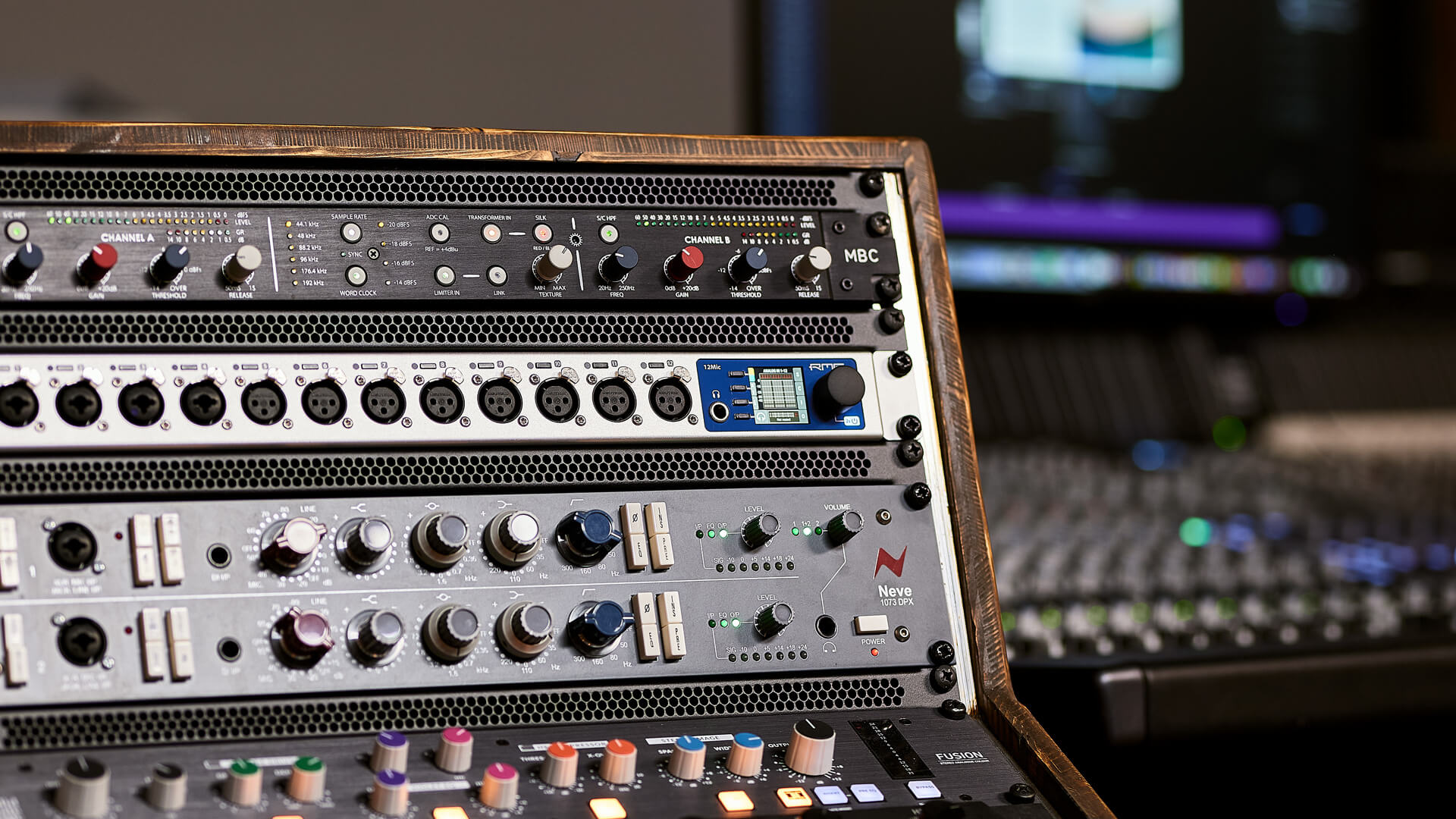
RME Audio mic pres deliver pristine, transparent audio reproduction.
Twelve transparent mic preamps for exceptional conversion performance
The PAD-free microphone input stages have a 75 dB gain range and accept signals of up to +18 dBu. On the converter side, the 12Mic shines with an outstanding signal-to-noise ratio on all channels. All twelve front-facing XLR connections accept microphone and line level signals, whilst the first four connections also accept TRS connectors, with switchable high impedance (Hi-Z) for instruments.
MADI & ADAT for maximum flexibility
In addition to Dante, the 12Mic-D has two separate MADI ports- with coaxial built into the device as standard, and optical MADI available via an optional SFP module - along with three ADAT outputs and a line level headphone output for monitoring all incoming digital and analog signals. With the help of a routing matrix, any of the 12Mic-D’s 204 input channels can be individually routed to any of the 218 output channels.
When connected to a Dante network, a combination of both analog and digital channels (such as connected MADI devices) can be transmitted to the network if required. In return, the 12Mic-D can receive up to 64 audio channels from the Dante network, which in turn can be forwarded to the headphones, ADAT, and two MADI connections as required.
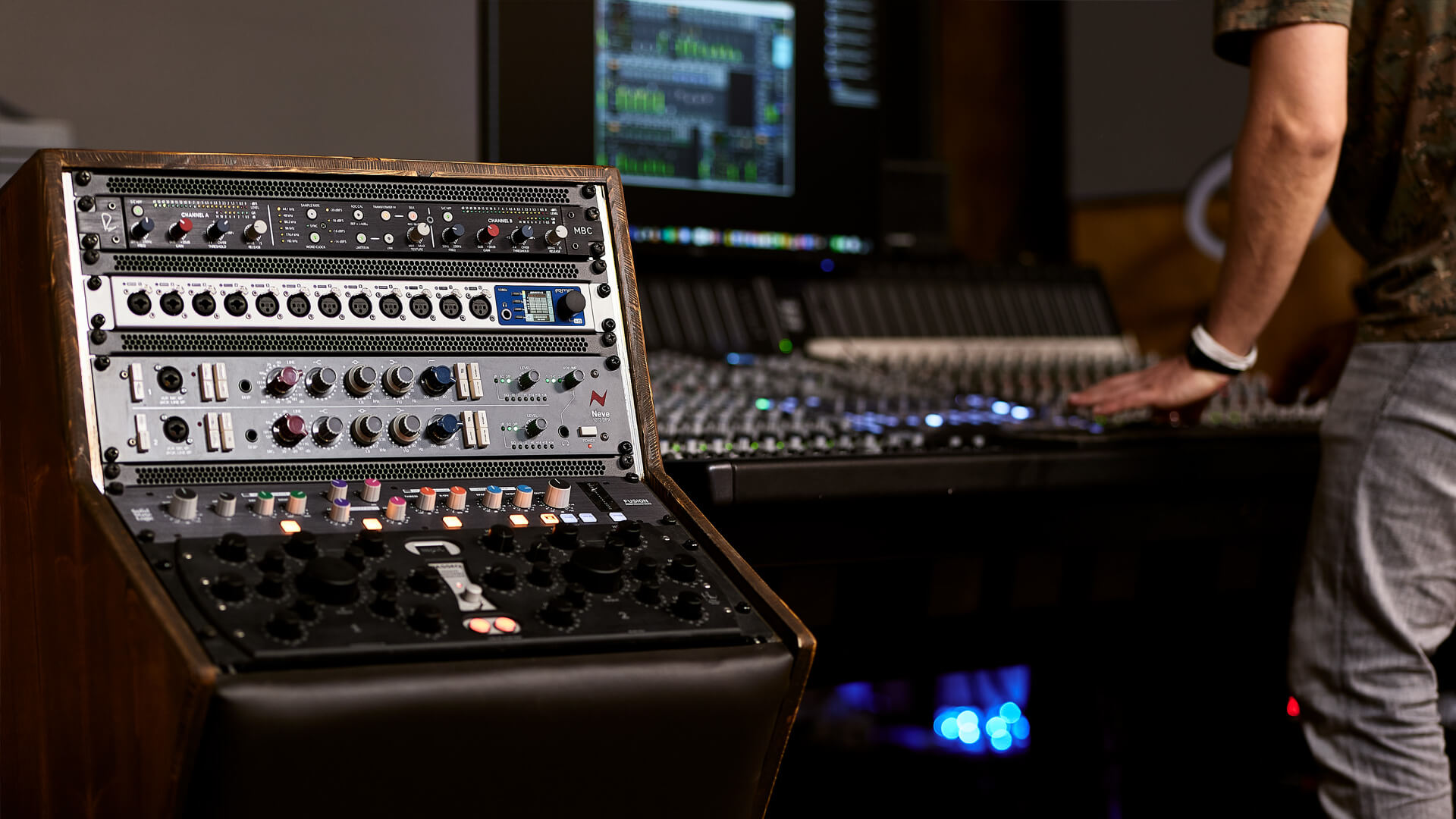
Four connections also accept TRS connectors with switchable high impedance (Hi-Z) for instruments.
Dante Audio Networking - 2 fully redundant network ports
With an ever changing landscape of network audio solutions, the challenge for RME’s development team was to design a highly performant device platform that will guarantee unparalleled flexibility and stability for years to come. To match these high requirements in accordance with RME’s core principles everything was built from the ground up. By integrating Audinate’s Dante IP Core on a custom built RME FPGA platform, RME is not only delivering a highly flexible solution but also gets one step closer to achieving a truly universal Audio Networking experience.
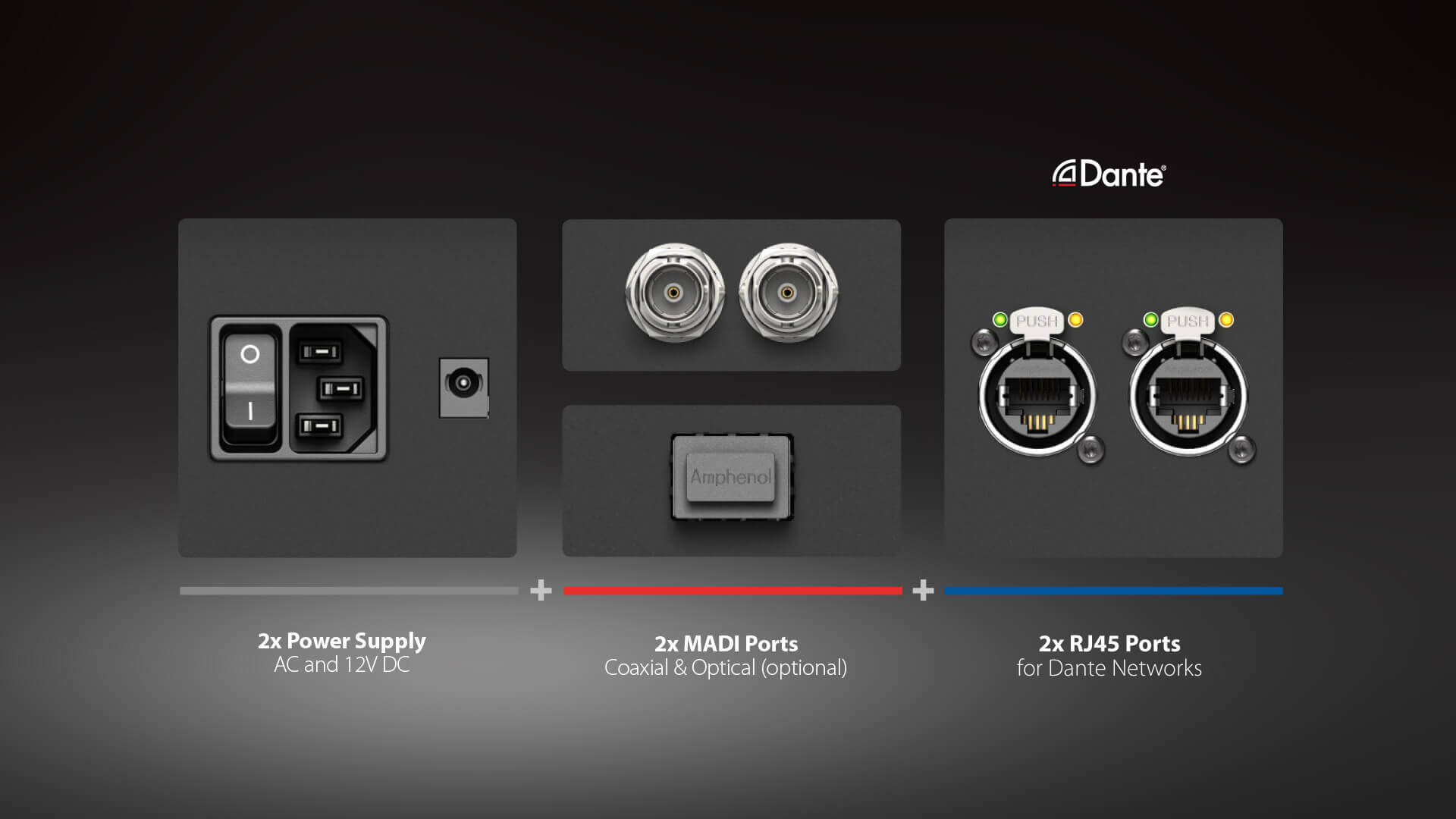
Multiple layers of redundancy make the 12Mic-D a perfect companion for any kind of live sound application.
Plug & play - rapid user interaction
Control all device states directly from the front panel for convenient, direct access to all features. RME network audio devices can also be fully remote controlled via a web-interface on any network link (including wirelessly over Wi-Fi), allowing for the rapid creation of gain groups, phantom power switching, and routing of signals to headphones for monitoring. The integrated routing matrix allows for quick routing of any analog inputs straight to the headphone output, as well as all digital signals. As such, problem-solving of signals, clocking, connectivity or other issues is both simple and straight-forward!
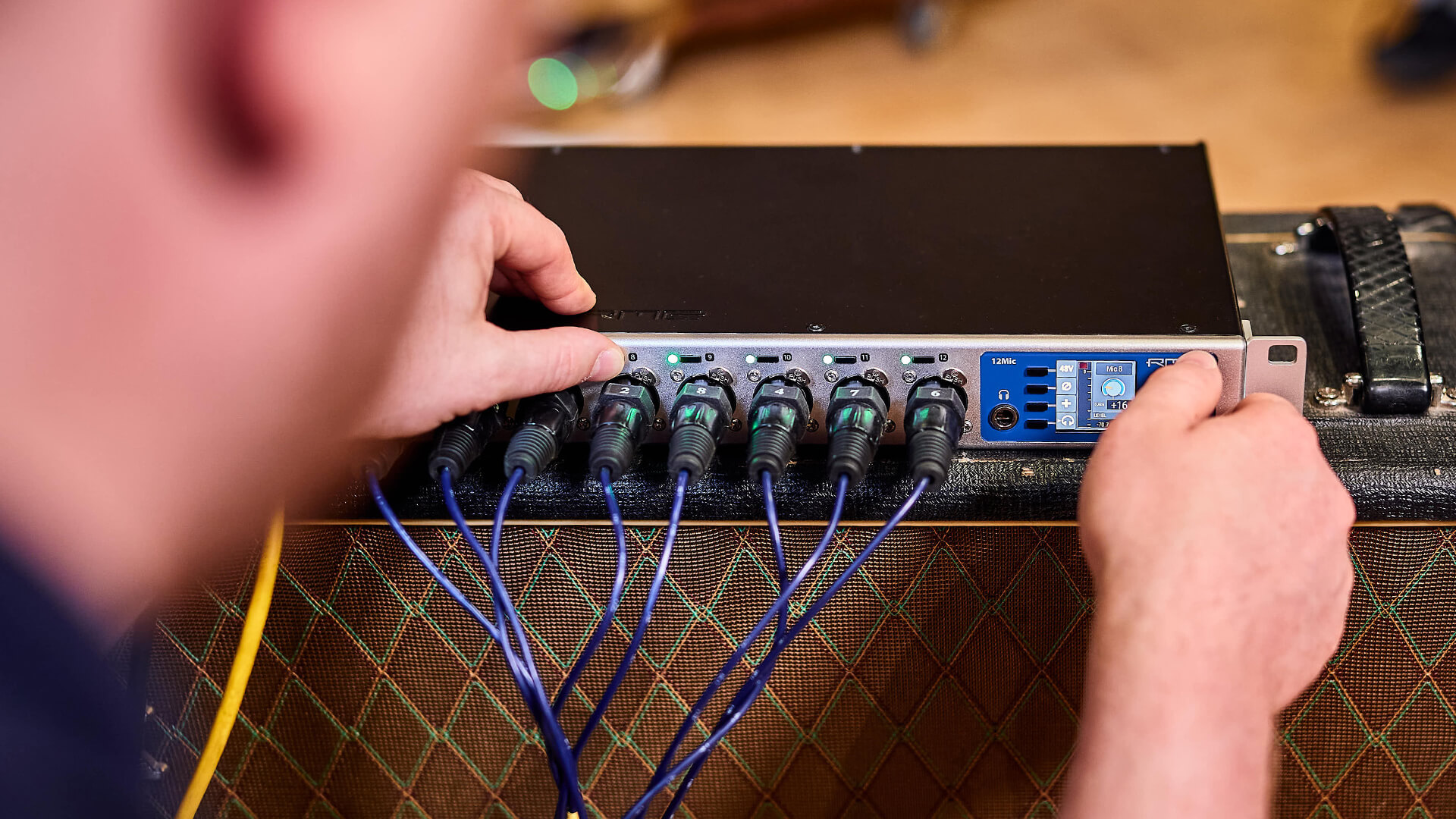
The 12Mic user interface optimized for rapid configuration & control.
States or controls can be operated directly on the front panel for each channel.
About MADI - Multi Channel Digital Audio Protocol
MADI is a protocol that has evolved alongside RME to be the most widely accepted multi channel digital audio protocol on the market. RME’s MADI-based systems deliver incredible reliability, particularly in applications where failure is not an option.
Accessories
Optical MADI SFP Module (optional available)
This module extends compatible RME devices with an optical SFP transceiver. Up to 64 audio channels can then be sent to and received from other MADI devices. THE RME SFP module is available in a Multi-Mode and in a Single-Mode version, it can be inserted and removed while the RME MADI device is powered on. It is not necessary to power down the device.
Specs
Inputs
XLR In 1-12:
- Input: XLR, electronically balanced
- Input impedance: 3.4 kOhm
- Gain range: 75 dB, 1 dB steps
- Resolution AD: 24 bit
- Frequency response @ 44.1 kHz, -0.1 dB: 8 Hz – 20.8 kHz
- Frequency response @ 96 kHz, -0.5 dB: 4 Hz – 29.2
- Frequency response @ 192 kHz, -1 dB: 3 Hz – 43.7
- THD @ 30 dB gain: < -110 dB, < 0.00032 %
- THD+N @ 30 dB gain: < -104 dB, < 0.00063 %
- Channel separation: > 110 dB
- Signal to Noise ratio (SNR): > 117 dB RMS unweighted, > 120 dB(A)
- Equivalent Input Noise (EIN), 30 dB Gain: 123 dB RMS unweighted, 125.5 dB(A) @ 150 Ohm
- Maximum input level, Gain 0 dB: +18 dBu
- Maximum input level, Gain 75 dB: -57 dBu
TRS In 1-4:
As above, but:
- Signal to Noise ratio (SNR): 115 dB RMS unweighted, 118 dBA
- TRS jack, balanced
- Gain range: 42 dB, 1 dB steps
- Maximum input level, Gain 8 dB: +20 dBu
- Maximum input level, Gain 50 dB: -22 dBu
- Switchable high impedance (unbalanced TS): 1 MOhm
DANTE:
- 2 x RJ45 for Dante network connectivity (up to 64 channels)
MADI:
- Coaxial via BNC, 75 Ohm, according to AES10-1991
- Optical via optional SFP module
- 62.5/125 and 50/125 compatible
- Accepts 56 channel and 64 channel mode, plus 96k Frame
- Single Speed: up to 64 channels 24 bit 48 kHz
- Double Speed: up to 32 channels 24 bit 96 kHz
- Quad Speed: up to 16 channels 24 bit 192 kHz
Word Clock:
- 75 ohm Word Clock BNC connectivity
- Support 44.1kHz - 192kHz
- Support full or single speed operation
- Intelligent Clock Control switches clock source seamlessly
Outputs
Phones 1/2:
- Resolution: 24 Bit
- Noise (DR): 115 dB RMS unweighted, 118 dBA
- Frequency response @ 44.1 kHz, -0.5 dB: 9 Hz – 22 kHz
- Frequency response @ 96 kHz, -0.5 dB: 9 Hz – 45 kHz
- Frequency response @ 192 kHz, -1 dB: 8 Hz - 75 kHz
- THD+N: < -100 dB, < 0.001 %
- Channel separation: > 110 dB
- Output: 6.3 mm TRS stereo (unbalanced) or mono (balanced) jack
- Maximum output level at 0 dBFS: +13 dBu (unbalanced), +19 dBu (balanced)
DANTE:
- 2 x RJ45 for Dante network connectivity (up to 64 channels)
MADI:
- Coaxial via BNC, 75 Ohm, according to AES10-1991
- Optical via optional SFP module
- 62.5/125 and 50/125 compatible
- Accepts 56 channel and 64 channel mode, plus 96k Frame
- Single Speed: up to 64 channels 24 bit 48 kHz
- Double Speed: up to 32 channels 24 bit 96 kHz
- Quad Speed: up to 16 channels 24 bit 192 kHz
ADAT:
- 3 x TOSLINK
- Quad Speed (S/MUX4): 1 x 2 channels 24 bit 192 kHz
Word Clock:
- 75 ohm Word Clock BNC connectivity
- Support 44.1kHz - 192kHz
- Support full or single speed operation
- Intelligent Clock Control switches clock source seamlessly
General
- 2x RJ45 for Dante® network connectivity
Single Speed: up to 64 channels 24 bit 48 kHz
Double Speed: up to 32 channels 24 bit 96 kHz
Quad Speed: up to 16 channels 24 bit 192 kHz - MADI input redundancy (requires optional SFP module)
- Internal routing of up to 268x282 channels
- 19” enclosure 1 unit height
- 1,54” full color display with control knob and four buttons for convenient, direct access to all features
- Remote control via HTTP & JSON
- internal PSU, optional 12V DC redundant power supply
- USB 2.0 (for remote control and firmware updates)
- DC-coupled outputs
Hardware Specifications
- Dimensions: 440 x 44 x 243 mm (17.3 x 1.7 x 9.6 inches)
- Weight: 2.8 kg (6.2 lbs)
- Package: 560 x 315 x 115 mm (22.1 x 12.4 x 4.5 inches)
- Conformity: CE, FCC, WEEE, RoHS
- Power supply: internal 30 W 100-240 V AC, external 12 V 2.5 A DC (optional)
- Power consumption: typ. 20 W, standby 0.5W
All specifications are subject to change without notice.
Drivers
Firmware 1.2.1R1. Main update. Carefully read the instructions in the readme.pdf!
Version 2.0.0 with support for the 12Mic, 12Mic-D, AVB Tool and OctaMic XTC, requires macOS 10.15 or newer!
Version 2.0.0 with support for the 12Mic, 12Mic-D, AVB Tool and OctaMic XTC, requires macOS 10.15 or newer!
Version 2.0.0 with support for the 12Mic, 12Mic-D, AVB Tool and OctaMic XTC, requires Windows 10 or newer!